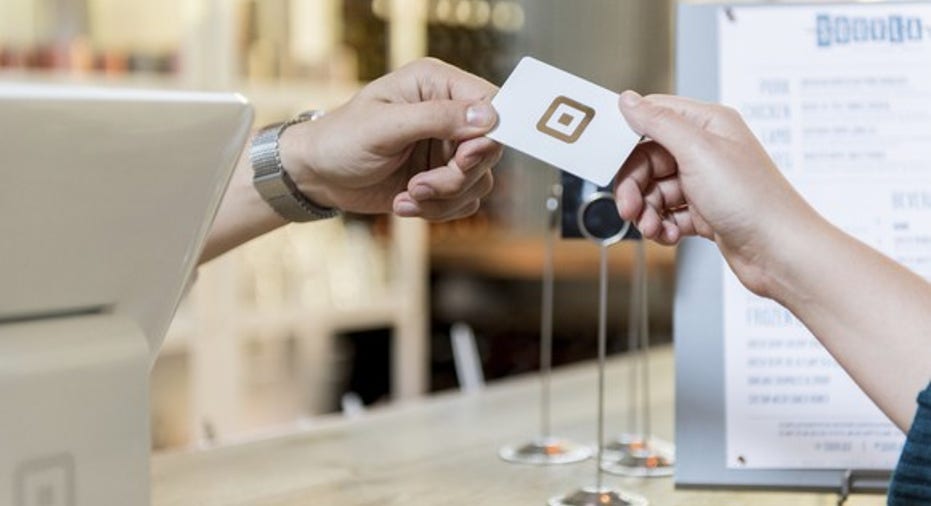Will Square Ever Become Profitable?

Over the last two months, analysts have really soured on Square . The consensus estimate for 2017 earnings has dropped from a loss of $0.02 per share to a loss of $0.31 per share. The biggest changes came following Square's disappointing first-quarter results.
Some analysts have even called into question whether the business model will become profitable in the foreseeable future. Its two main businesses -- payments processing and business loans -- have some underlying issues.
Image Source: Squareup.com.
Small merchants, small payments
Square specializes in providing credit card payment processing to small merchants. It charges a flat 2.75% fee for each swipe, and it acts as an agent for all of the merchants it serves. That means Square handles all the processing fees for payment networks, including the $0.20 fee Visa and MasterCard charge on top of their swipe rate for each merchant.
That means if your local coffee shop uses Square to process its payments, Square is probably taking a loss on most of those latte purchases. Wedbush analyst Gil Luria points out that Square takes losses on 0.076% of its transactions. That's significantly higher than the 0.0029% Heartland Payment Systems experiences since it doesn't act as an agent (i.e. it doesn't absorb the $0.20 fee).
Square says its average transaction value is $53, so the $0.20 doesn't come into play too much. But in order to improve its ratio of high-value transactions to low-value transactions, Square needs to move up from small merchants to medium-to-large merchants. Evercore ISI analysts think that could be more difficult for Square than it sounds.
Square's flat 2.75% fee is often higher than what most large merchants pay to process payments. "In order to increase acceptance, Square negotiates pricing discounts and other incentive arrangements with larger merchants," Evercore analysts wrote in Barron's. "Square's strategy to increase acceptance at larger merchants ... will likely drive its transaction revenue yield down over time."
Evercore also points out that Square faces pressure from competition with small merchants. PayPal , for example, provides a similar system to Square and undercuts its pricing with a flat 2.7% rate. PayPal has yet to make a big impact on in-store payments, but its 184 million active users will make it a substantial threat if it can figure out how to get them to use PayPal in stores. Continued pressure from competition could put a damper on adding new merchants and growing payment volume.
Still, Square's value-added functionality that it provides to merchants -- its dashboard full of pretty sales data and analytics as well as accounting help -- will help it hold onto existing merchants. It may be the differentiating factor that allows it to continue growing with small businesses that get the most use out of that functionality.
Low-quality loans from Square Capital
Square Capital is the lending arm of Square. Square uses the data it collects from merchant transactions to determine the creditworthiness of borrowers. It then takes a percentage of future payments to help pay off the loan and interest. Square extended $153 million through more than 23,000 in loans and advances last quarter.
Growth in Square's loans has slowed significantly, rising just 4% sequentially last quarter. Management cited "more challenging credit market conditions" as the reason for the slowdown.
Gil Luria at Wedbush thinks it could be that merchants are wising up, and Square is finding it more difficult to find risks worth taking. He points to a call he held with Barry Sloane, chief executive of Newtek Business Services (a small business lender), who noted that cash advances like the ones Square makes are often a dis-economic last resort for businesses.
Square Capital is in the process of transitioning from cash advances to loans. As part of its deal with the bank it partnered with to originate the loans, Square is taking on a small portion of the loans it's making through Square Capital. That makes the risk much greater for Square investors should the company find itself overextending the loan program to less qualified businesses in order to grow the segment. It also means loan defaults will have a much greater potential impact on Square's profitability.
Again, the one thing Square has going for it is the ease of use. Square's access to sales data and inventory makes loan approvals (or denials) a simple process for merchants compared to traditional bank loans. That should help it maintain the quality of its loans, but growth in the segment might be slower than expected a couple of months ago. Since loans are the company's main profit growth driver going forward, the runway for Square to turn a profit may need to be extended further out. That's exactly what analysts have done over the last two months, as its hard to see profits in the near future.
The article Will Square Ever Become Profitable? originally appeared on Fool.com.
Copyright 1995 - 2016 The Motley Fool, LLC. All rights reserved. The Motley Fool has a disclosure policy.



















